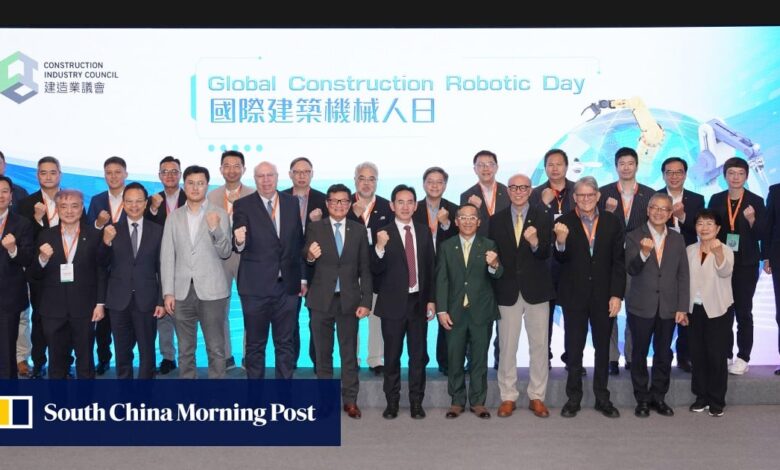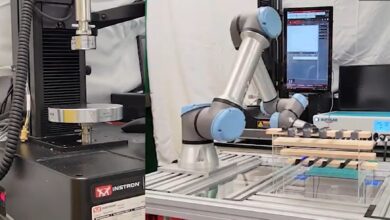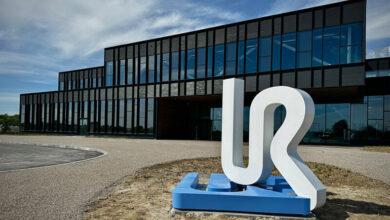The “CIC Global Construction Robotic Day” event promotes the wider adoption of automation on and off site to transform the sector

[The content of this article has been produced by our advertising partner.]
Leveraging the growing trend of robotic solutions in construction, with over 200 robots currently operational on Hong Kong sites, the event provided a platform for local industry professionals to deepen their understanding of the potential of robotics in boosting productivity, efficiency, quality, sustainability, and safety. Crucially, it fostered future partnerships between construction firms and robotic solution providers.
Originally launched a robotics workshop in 2023, the event has evolved into a two-day global conference, technology pitching and exhibition this year. This expansion is part of the CIC’s initiative to assist industry professionals in reducing the costs of time, manpower, and market research associated with innovative operational transformations. The event received enthusiastic support from over 8,000 attendees, both in-person and online.
Ir Professor Thomas Ho, Chairman of the CIC, provided an overview of the initiatives launched by the Council to ready the local sector for a ‘golden era.’ These initiatives include Mi Infinity (Modular integrated), Modular integrated Construction (MiC), Mi Mechanical, Electrical and Plumbing (MiMEP), and other assembly-based construction methods; the development of a Common Data Environment (CDE) with ‘Digital Twin’; and the promotion of construction robotic applications. Ho added, “These initiatives are integrated for high-quality and sustainable construction. The adoption of construction robots will not only ensure a safer working environment but also boost productivity, stimulate creativity, and facilitate workforce development. This transformative shift in the construction industry has the potential to redefine the sector and set it on a path towards a more prosperous and sustainable future.”
Ho also emphasised the need to achieve ‘New Quality Productive Forces’ for the sector through revolutionary technological breakthroughs, innovative allocation of production factors, and deep and sustainable industry transformation and upgrading. He noted, “The key to accelerating development is to build the industrial ecosystem and share supply chains, covering aspects such as smart construction and production, and the Digital Twin platform.”
Global conference
The Global conference, featuring experts from Germany, Japan, Mainland China, Spain, Singapore, Switzerland, the United States, and Hong Kong, provided insights into the latest developments in construction robotics technology. The experts also shared their practical experiences in implementing robotics in construction projects. These engaging discussions, particularly pertinent to Hong Kong and the GBA’s sustainable development, resonated with many participants.
One of the highlights was a presentation on “Future Trends in Intelligent Robotics Inspection and Maintenance of Civil Infrastructure” by Professor Carlos Balaguer from the University Carlos III of Madrid, Spain. He discussed how robotic applications, from a European Union perspective, help address safety concerns and reduce maintenance costs. He also highlighted the integration of advanced technologies in both autonomous and teleoperated systems, including intelligent robotics, NDT sensors, Digital Twins, and AI tools for inspection and maintenance. Professor Balaguer showcased four successful EU projects: OMICRON, BIMprove, ROBO-SPECT, and Atlantis. He concluded that high-precision robotic applications contribute to cost-effective and safer operations and advocated for supporting tech start-ups and university education in this field.
The keynote speaker, Professor Roberto Horowitz, Mechanical Engineering, UC Berkeley, and James Fife Endowed Chair, introduced a new model of construction innovation where labs and start-ups contribute to the sector’s technological transformation. He noted that the Automation Tech Centre at the Hong Kong University of Science and Technology, established in 1992, has over 100 alumni, with more than half of them founding their start-ups. Drawing from experiences in Japan, the Hong Kong Center for Construction Robotics (HKCRC) has developed numerous smart solutions to enhance safety and improve production quality. The HKCRC serves as a vital bridge between the construction industry and academic and research institutions, promoting the latest construction robotics internationally.
Professor Thomas Bock, retired professor at the Technical University of Munich and Director of Bock Robotics Revolution, highlighted projects centred on rapid robotic realisation. These projects, suitable for high-density metropolises like Hong Kong, were implemented in various countries, including Japan, Germany, and the US. They involved MiC, modular interior finishing robots, and compact robotic sites with integrated machinery for high-rise construction, among other solutions. Bock also advocated for telerobotics and human-robot collaboration in high-risk tasks such as slope inspection and maintenance in Hong Kong.
Jeremy Sang of Kuka Robotics (Shanghai) Ltd, serving in Industry Management – COG, gave an overview of the company’s new robotic application centre and its customised robotic solutions tailored for individual companies.
Ar. Donald Choi, Chairperson of the Construction Innovation and Technology Application Centre Management Board, CIC, and CEO of Chinachem Group, noted the maturity of construction robotic technology has stimulated industry demand. He urged for increased multidisciplinary collaboration, suggesting that medical robots could be adapted for construction applications. Choi also called for more investment in upskilling current practitioners and fostering a new generation of highly skilled construction robotic professionals.
Latest robotics on display
At the “Construction Robot Exhibition”, held concurrently with the conference, 24 leading construction robot suppliers from Hong Kong and Mainland China showcased their latest solutions. These solutions, already operational worldwide, incorporate cutting-edge technologies developed domestically and overseas through international partnerships.
The exhibition provided industry practitioners with a deeper understanding of robotic applications for the entire construction process. The robots, designed for improved worker safety and superior production quality, have applications ranging from interior finishing to exterior building walls and other construction site aspects. For example, the displayed systems included robots for spray painting, floor grinding, wall plastering, and indoor floor tiling. These were exhibited alongside robotic systems for measurement, demolition, rebar tying, façade cleaning, and other construction tasks. On-site suppliers actively demonstrated their solutions to local industry practitioners and engaged in lively exchanges of questions and ideas.
Among the exhibitors, RoboticPlus.AI (Shanghai) Co Ltd showcased its RoBIM, a flexible control software for industrial robots based on CAD-CAPP-CAM data flow. The company, which joined a Middle East visit led by HKSAR’s Secretary for Innovation, Technology, and Industry, Professor Sun Dong, in March, received a warm reception from property developers for its robotic technologies. Founder and CEO, Hyde Meng, expressed optimism about Hong Kong and Mainland Chinese I&T companies exploring business opportunities in the region, leveraging platforms established by the Government and various organisations like the Hong Kong Science and Technology Parks Corporation.
CIC’s Ho underscored Hong Kong’s potential to emerge as a hub for construction robotic technologies, manage them as assets, and promote their global applications. In collaboration with the Government and research institutes, CIC has been recruiting and sourcing expertise worldwide.
Ho stated, “CIC is dedicated to fostering industry cooperation and coordination to advance the application of construction robots, anticipating many future jobs will involve human-robot collaboration. The CIC plans to offer construction robot operation courses for current practitioners and the new generation to facilitate industry-wide upgrading and transformation.”
He added, “We will persist in collaborating with various organisations and chambers of commerce to research and address challenges related to the application of robotic technology. Our goal is to expedite the industry’s adoption of robotic solutions on and off construction sites.”



